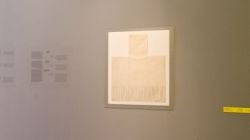
Michal Na'aman / Rosa Luxemburg
Michal Na'aman
Born on Kvutzat Kineret, 1951
Lives and works in Tel Aviv
This work by Michal Na'aman, which was created in 1975, appears as a local, verbal, and ascetic version of Judy Chicago's The Dinner Party in terms of its engagement with female presence and absence. Using a pencil and an elongated script that can be deciphered only with difficulty, Na'aman writes the name of the revolutionary socialist, anti-nationalist, and feminist activist Rosa Luxemburg, alongside the misspelled names of two fictional heroes. These literary figures - the biblical prophet Jonah and Shakespeare's King Lear - are feminized by Na'aman, becoming the Prophetess Jonah and Queen Leer. Her concern with these figures may also be associated with the artist Raffi Lavie, who lived at 42 Prophet Jonah Street in Tel Aviv, and with the myth of a spiritual father who has several artist-daughters; with the three daughters of King Lear; and with a long line of spiritual mothers and daughters embraced by male fathers and sons.
Rosa Luxemburg
1871, Zamosc, Poland
1919, Berlin, Germany
Rosa Luxemburg was born in Poland into an educated Jewish family. In 1887, she became active in revolutionary circles. Following the outbreak of the First World War, she founded an organization that served as the basis for the German communist party, and was subsequently arrested and condemned to two years in prison. While in prison, she continued to write and express her political views, including her support for Lenin and the Bolshevik Revolution. In November 1918, she was released from prison and began working to foster a communist revolution in Germany. In January 1919, Luxemburg was caught in Berlin by the members of a radical right-wing organization, and was murdered in retribution for her political activities.